- Home
- Deborah Harkness
The World of All Souls Page 27
The World of All Souls Read online
Page 27
“Your wife won’t be satisfied leaving it there. She will worry at this like a hound with a bone.” Raleigh crossed his arms over his chest and scowled. “Very well. If you must know, Henry Percy is the ninth knight. His unwillingness to embrace the Protestant faith makes him vulnerable to allegations of treason here in England, and in Europe he is an easy target for every malcontent who would like to see Her Majesty lose her throne. Philippe offered him the position to shield him from those who would abuse his trusting nature.”
“Henry? A rebel?” I was stunned.
“He’s a powerful man, Diana, for all his soft skin and boyish manners.” Walter held out a polished pewter spoon. “Eat.”
My questions answered—for the moment—I did what Raleigh commanded. The heat of the fire and the warmth of Brother Barnabas’s excellent soup soon had me drowsing at the table, my lullaby the soft conversation between Matthew and Walter.
Next morning Matthew bundled me into the saddle in front of him to make up for lost time. We covered the distance to the south coast at a breakneck pace. I was accustomed to Dover as the preferred departure point for the Continent, given the relatively short distance between it and the French coast, and was surprised that we were taking a longer route. Going from Portsmouth to Guernsey and then on to France meant we avoided the English stronghold of Calais and the more traveled roads around Paris. This crossing would be treacherous given the tricky currents, winds, and tides, Matthew explained, but Walter and Gallowglass could make the journey blindfolded.
In Portsmouth I studied the thick stone walls that had been built to protect the harbor from French attacks and noticed the number of ships at anchor—bulky merchant vessels, small fishing craft, even a few imposing warships outfitted with guns. Raleigh and Gallowglass disappeared for several hours and returned having procured a boat for the crossing. Both looked at me blandly when I asked for further information, and Matthew’s forbidding expression soon stopped my questions.
Whatever vessel we were sailing in was stolen.
One glimpse of the boat made me wish that the thieves had been more daring. The small vessel had only two sails, a rough deck made from salvaged materials including a garden gate and a battered door, and a distinct smell of fish about it. A few oars rested by the gunwales.
“It’s not likely to sink—not before we reach Guernsey in any case,” Walter said, flipping over a coil of rope with his toe. A crab scuttled down the deck in alarm, and I was tempted to do likewise. Instead I put one foot on the rickety surface.
“If you need a break from rowing, I can lend a hand,” I told Gallowglass as he helped me into the boat. Pierre chuckled and said something unintelligible in French.
“I’ll be sure to let you know, Auntie,” Gallowglass said in a measured tone, though his eyes crinkled in amusement. He glanced at his uncle. “So the witch has been around boats? You never cease to surprise me.” My husband gave him a withering look and hopped in after me.
“Gallowglass grew up with an oar in his hand,” Walter said with a grin. “As he’s a wearh, he could probably row us to Virginia and back. We will have no trouble reaching Guernsey.”
On board, Raleigh gave me a choice of seats: in the stern with him or down in the hold. The first was exposed to the elements, and the fresh breeze was rapidly becoming a cold wind. The second was close and sour smelling. Though I had never been seasick, I elected to play it safe and sit where my eyes could remain on the horizon. Matthew bundled me up not only in my cloak but also in his own, Gallowglass’s, and Pierre’s. The vampires, after all, didn’t need them.
Once the sun set, however, not even four cloaks could keep the cold at bay. Raleigh, cheeks bright red with excitement and the wind, seemed as oblivious to the temperature as the rest of them, but I was not so fortunate and crept below. There the pitch of the boat was more obvious than it was on deck. Matthew unwound my cocoon and spread one cloak on the none-too-clean wooden table. He tightened the other two over my recumbent form so that I would be less likely to roll off in the swells, and returned to help steer us to shore.
Raleigh’s knowledge of the waters got us to the island off the French coast in less than twelve hours. He was assisted by Matthew’s excellent night vision, a stiff southwesterly wind, and Gallowglass, who kept up a running commentary about the poor construction of the ship.
At last we disembarked and entered the village of Saint-Pierre. It was a frontier town, and its battened-down shutters and jumpy residents gave off an aura of ready violence. Soon the people of Guernsey discovered that it was Walter and Gallowglass who had arrived, and the welcome became warmer. Pirates, smugglers, and outlaws of various nationalities appeared out of the murk to pass the time and share news. One escorted us to a nearby tavern that was still open for business despite the hour.
“Look what the cat’s dragged in. Where’s your shadow, Gallowglass?” A petite woman with long black eyelashes and a complexion the color of churned cream stood in front of a cask of wine, hands on hips. She looked eagerly around his bulky shoulder and found me instead. My skin turned frosty under her gaze.
“Hello, Lizzie.” Gallowglass bent over and smacked a kiss on each of her pale cheeks. “Hancock’s gone to Anglesey for Yule. I did think he expected to find his wife waiting to welcome him.”
Lizzie sniffed. “Davy drinks too much when he’s with his family.”
“Hancock will come here and fetch you, whether or not you want to go.” Gallowglass sat down with a groan and beckoned at one of the servers.
“He is welcome to try,” Lizzie said darkly. She grabbed at the pitcher of wine and two tankards from a grizzled man with a rolling gait. “These will do for the warmbloods, Brandon, but bring our best for the other gentlemen.” The female vampire fixed black eyes on Matthew. “What are you up to, then, young Matthew? Nothing good, I warrant.”
Matthew looked frazzled. “Gallowglass assured me you would be in Wales.” My stomach dropped. Matthew kept saying there was no chance of running into his mother at Sept-Tours, but it seemed no one was where they were supposed to be.
“We’ve traveled down that road already.” Birdlike eyes looked at me with amusement and a touch of speculation. “As your man seems unwilling, you might tell me what to call you.” Matthew stepped forward, and Lizzie put up an imperious hand. “Do not interrupt, lordling.”
Walter and Gallowglass busied themselves with the fastenings on their cloaks.
Matthew, unmoved by Lizzie’s swagger, responded anyway. “This is my wife, Lizzie.”
“And her name?” Lizzie waited for a few moments, then gave an exasperated sigh. “You cannot expect me to address her as Madame de Clermont, given the way I feel about your mother.”
“Diana,” I said quickly, and bobbed a curtsy.
“Merciful Mary.” Lizzie gave a low whistle. “What I wouldn’t give to see Ysabeau’s face when she discovers that her beloved Matthew has wed a witch.”
“When lasses whistle, Lizzie, the devil laughs outright,” Gallowglass warned.
“If it’s proverbs you’re after, you great Norse wolf, how about this one: A p’tit pourche grosse pândis.” Lizzie’s hands came to rest on her hips. “‘The smallest pig gets the biggest parsnip.’ Or at least he has thus far. I’m not sure what Ysabeau will dish up for her pet when she hears this news.” I tensed at the mention of Ysabeau.
“My mother is in Germany,” Matthew murmured, resting his hand on my shoulder. This was no comfort; his mother was anything but predictable.
“Aye, and I’m in Wales.” Lizzie’s smile was mischievous. “If women did what men expected them to do, life would be very dull.”
“And there would be far less bloodshed and trouble. Has Brandon gone to Saint-Malo for my drink, or are your cellars as disordered as your household?” Gallowglass’s patience with pleasantries had evaporated.
“There’s nothing wrong with my cel
lars.” Lizzie poked a finger at Walter as he moved past, stripping himself of his weapons. “You’re very quiet, poppet. What say you about all this?”
“If it would make any difference, I’d say it’s none of your affair, Lizzie.” Walter’s dagger landed point down in the table. “Show Matthew and his new bride some of your famous hospitality—a room with a bed and a fire in it, if you please. We have business with Crooked Ned. Then you can placate Gallowglass. You know how he is when he’s hungry.”
Lizzie grumbled, but she followed his orders. Matthew and I were shown into a room with a small bed and a crackling fire. The personal objects here and there—a carved shell on the mantel, a potted hellebore sitting on a windowsill—led me to believe this was Lizzie’s own bedchamber. I slept most of the day while Matthew and Raleigh talked to the aptly named Crooked Ned, awoke in the evening long enough to have some vegetable stew and cheese, and then slumbered until past midnight.
Matthew roused me in the dark of Monday morning. “It’s time,” he whispered.
Walter left us at Guernsey, a lantern in one hand and the other lifted in farewell. There was a price on his head in Catholic Europe, and he could go no farther. “The penalty of being a hero,” he’d explained with his flashing grin and wicked eyes.
The task of navigating the tricky waters now fell to Gallowglass. We were in an even smaller boat for the next leg of our journey, but it was more seaworthy than the first. Silently he rowed us south through the inlets between the islands of Guernsey, Herm, and Sark and out into the bay, where the tides whirled in all directions. Pierre sat in the bow with a shuttered lantern. Matthew stood by my side, one foot resting on the edge of the hull. I gripped the gunwale with one hand, Matthew’s knee with the other.
“What’s our next port? The usual place?” Gallowglass asked quietly as he put down his oars and raised the solitary sail. Though it would be more than four hours before the sun rose, other craft were visible in the darkness. I picked out the shadowed outlines of a sail, a lantern swinging from a post in the stern of a neighboring vessel.
“Walter said we were going to Saint-Malo,” I said, my head turning in consternation. The port was full of men without allegiance to the French. Some had sailed under his command, and Walter had promised the rest could be made cooperative with a few coins.
“I remember well enough where Raleigh told me to go, Auntie, but he’s a pirate. And English. And he’s not here. I’m asking Matthew.”
France
Mont Saint-Michel
The boat was lifted up on the waves, and through the mist a steeple pierced the clouds. It was surprisingly close, the base of the structure obscured by weather.
We entered a room with a forest of columns holding up its vaulted roof. Large fireplaces studded the walls, spreading blessed warmth.
Diana and Matthew’s first port of call in sixteenth-century France, the famous Mont Saint-Michel, is a fortified monastery perched on an islet just off the coast of Normandy. There has been a monastery there since the eighth century, founded by Bishop Aubert of Avranches. Surrounded by treacherous quicksands at low tide and the swirling waters of dangerous currents at high tide, Mont Saint-Michel has proved an impenetrable stronghold through the centuries, both in and out: For decades after the French Revolution, it was also used as a prison. Mont Saint-Michel was the original base for Louis XI’s Order of St. Michael (the motto for which Matthew whispered as they approached it), with the Knights Hall dedicated to the order.
50170 Mont Saint-Michel
See also: ORGANIZATIONS: The Order of St. Michael
City of Fougères
After braving the exposed sands around Mont Saint-Michel at low tide and traveling inland, de Clermont allies welcomed us into the city of Fougères and lodged us in a comfortably appointed tower on the ramparts overlooking the French countryside.
Diana and Matthew stopped briefly at Fougères on their way to Sept-Tours. It is an ancient French town on the edge of Brittany, dating back to the end of the tenth century, and it can still be explored today.
35133 Fougères
Château de Baugé
“This was René’s favorite hunting lodge. It was so full of life when he lived here, with artists and scholars in every room.”
The game that resided in the well-stocked forests surrounding Château de Baugé drew Matthew’s old friend René, Count of Anjou, to build this grand hunting lodge in the mid-fifteenth century. René was famed in his time as both an amateur painter and an author of several books, including King René’s Tournament Book, describing the rules and customs of medieval tournaments.
Château de Baugé, Place de l’Europe, 49150 Baugé
Village of Saint-Benoît-du-Sault
We reached the stone walls and timbered houses of Saint-Benoît on schedule, just as Philippe had commanded.
Saint-Benoît-du-Sault, through which Matthew and Diana passed, is a beautiful French medieval village of winding cobbled streets overlooking the Portefeuille River, just northwest of the more dramatic landscape of the Auvergne.
Saint-Benoît-du-Sault, 36170
The Auvergne
The landscape of the Auvergne is a microcosmic reflection of Matthew Clairmont’s appearance, history, and personality. It is at once forbidding and beautiful, with awe-inspiring peaks and shadowed valleys. Forgotten villages cling to the hillsides, their basalt fortresses and Romanesque churches a persistent reminder of how important this region once was to the history of medieval Europe. Now it is all goat herds, cheese making, and ecotourism, but once this was the political and religious center of the Christian West. The First Crusade set off from this region, and even now you can climb the peaks and see the traceries of the pilgrim road from Paris to Compostela snaking over the mountains.
It is in the Auvergne that the ancient vampire elite settled when the Roman Empire crumbled and before the modern nation-states of Europe rose to power. The patriarch of the de Clermont clan, Philippe de Clermont, built his empire here in a village called Saint-Lucien, and the de Clermonts have remained there ever since in their castle of Sept-Tours.
The de Clermonts also own other castles in the area, which is typical of the ancient vampire families who settled there during times of vampire warfare, when it was necessary to fortify their territory against possible invaders. In the case of the de Clermonts, the rival power in the Auvergne is Gerbert d’Aurillac, whose base is at Château des Anges Déchus (Château of the Fallen Angels) in the nearby Cantal. Though an uneasy détente has been achieved between the d’Aurillac and de Clermont vampire clans, their castles are a constant reminder of how vicious the contest for power once was.
Château des Anges Déchus
Arm in arm, Ysabeau and Marthe walked out into the crisp dawn. The towers of Château des Anges Déchus grew smaller and smaller behind them until they disappeared from sight.
Gerbert d’Aurillac’s château is based on the Château du Sailhant in the Auvergne. Dating from the thirteenth century, this fortress was built on a triangular outcrop, with dungeons at each corner, and has changed hands frequently through the centuries. Château des Anges Déchus is the perfect base from which Gerbert can plot and scheme, controlling his large network of vampires. It is also in close enough proximity to the de Clermonts for him to keep an eye on their movements.
Château du Sailhant, Lieu-dit Le Sailhant, 15100 Andelat
La Pierre
We descended toward something that looked like a crater set apart from the surrounding countryside by yawning ravines and overgrown forests. It proved to be the ruin of a medieval castle, with high walls and thick foundations that extended deep into the earth.
When witch Satu Järvinen yanked Diana out of the gardens at Sept-Tours, she took her to La Pierre and held her captive there. La Pierre is based on a medieval ruin in the Auvergne called Château de Murol. A formidable fortress dating from the tw
elfth century, it survived many sieges during the French Wars of Religion and was later abandoned as a residence following the French Revolution. Used briefly as a prison and reportedly a thieves’ lair, it eventually fell into ruin in the nineteenth century.
Château de Murol, La Rivière, 63790 Murol
As a historian and a writer, I try to stick as closely as I can to what is really possible. Why make up a ruin if there’s a perfectly good one that you can tweak, adapt, and modify? I knew nothing about the medieval architecture of the Auvergne when I started writing A Discovery of Witches, but I’m so glad that my work has led me (and other people) to have a better appreciation of this history-steeped region. As for the tweaking, Château de Murol doesn’t have an oubliette—I added one!
Church at Saint-Lucien
Like many religious buildings in this part of France, Saint-Lucien’s house of worship was already ancient in 1590. Its simple lines were altogether different from the soaring heights and lacy stonework of a Gothic cathedral.
The village church of Saint Lucien witnesses pivotal moments in Matthew and Diana’s story over the centuries. It was in the half-built structure that Ysabeau found Matthew’s broken human body, and then gave him his rebirth as a de Clermont; Matthew and Diana were married at the door of the church in 1590; and finally in the twenty-first century their twins, Rebecca and Philip, were baptized there.
The inspiration for Saint Lucien came from a Romanesque church built in the sixth century (as Saint Lucien would have been) called Sant’Apollinare in Classe, Ravenna. The village church would have been far simpler than this one, with Matthew’s hand evident in the carpentry, but the design and decorations would have been similar in style.

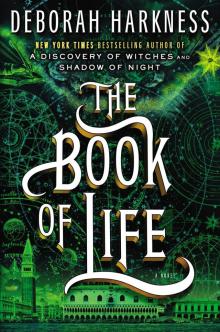 The Book of Life
The Book of Life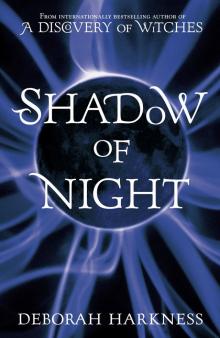 Shadow of Night
Shadow of Night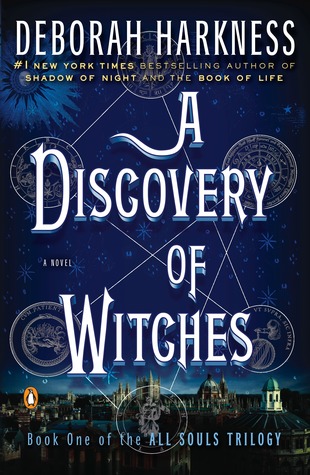 A Discovery of Witches
A Discovery of Witches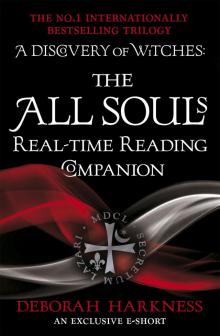 The All Souls Real-Time Reading Companion
The All Souls Real-Time Reading Companion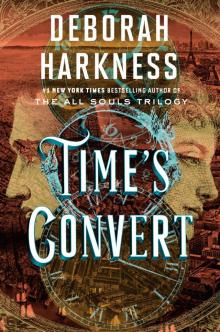 Time's Convert
Time's Convert The World of All Souls
The World of All Souls A Discovery of Witches: A Novel (All Souls Trilogy)
A Discovery of Witches: A Novel (All Souls Trilogy)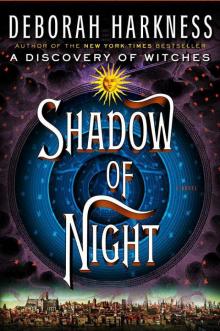 Shadow of Night: A Novel
Shadow of Night: A Novel